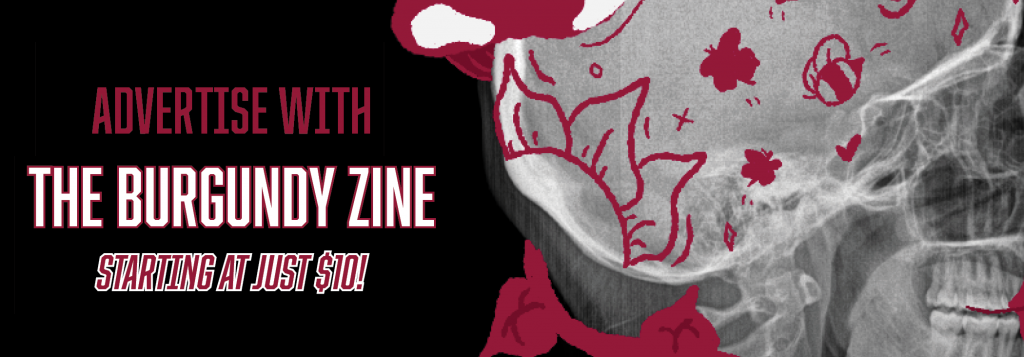February 25, 2021
Ghost Kitchens: The Mystery That Currently Haunts Your Favorite Food Delivery Apps

By: burgundy bug
Ghost Kitchens: The Mystery That Currently Haunts Your Favorite Food Delivery Apps
Source: The Burgundy Zine
“Hey, what’s with all of these places in our recommended restaurants,” said my partner Xavier, as he scrolled through a list of nearby establishments on DoorDash. “Why do they all just specialize in one food, why do they all have the same looking photos, and what’s with their quirky names?”
“I’m not sure,” I shrugged. “One thing is for sure though — some local photographer is making a killing doing photos for all these new pop-ups… Hey, maybe I should get back into freelance photography.”
But something else was off about these new places emerging out of thin air, all boasting the same Gen Z-targeted marketing. When we searched for these restaurants online to see where they are, they didn’t exist.
At all. No address, no website, no phone number. Occasionally, one search might pull up an establishment with a similar name, but a completely different logo. Or it’ll only have one location — and it’s on the opposite end of the country.
Sounds spooky, doesn’t it? Well, these virtual restaurants often hail from aptly-named ghost kitchens.
These are kitchen spaces specifically designated for cooking up delivery-meals, and multiple restaurant brands may operate out of them simultaneously.
This allows big-name chains to expand their delivery operations without having to establish a whole new location. It also allows for these companies to create virtual restaurants, which Grubhub defines as:
“A Virtual Restaurant is a restaurant that has a full menu but does not exist in its own space. These menus only exist online on platforms like Grubhub and are only for delivery.”
— “What is a Virtual Restaurant?” via Grubhub
“Virtual Restaurants use a shared kitchen with another business to cook their food,” Grubhub adds. “Sometimes these are partnerships and other times the restaurant itself wants to experiment with a new flavor so they’ll build a second menu only available online and cook the food in the same kitchen.”

Read: Philly restaurant owners are scaring up delivery business during the pandemic with ‘ghost kitchens’
The Philadelphia Inquirer
The food delivery market had been on the rise for years, but social distancing restrictions due to the coronavirus pandemic have pushed its growth into overdrive.
The food delivery market has grown from $107 billion in 2019 to $136.4 billion in 2020.
SOURCE: STATISTA
Ghost kitchens and virtual restaurants offer a major advantage to corporations and local eateries alike. For example, if the chefs want to test the waters with some experimental dishes, they can do so under a virtual identity without it hurting the reputation of their main restaurant.
However, there is a moral dilemma that comes into play — transparency.
The average consumer may not realize the gourmet, authentic Italian dish they’re ordering from Pasqually’s Pizza is actually from Chuck E. Cheese. And the average consumer may not be so keen on that.
@playboylacroix let me know if you know anymore! These are the ones I’ve noticed so far… lol. Sneaky restaurants ##doordash ##dasher ##chilis ##bucca ##711 ##chuckecheese
♬ flashing lights – chillytunees
Nowhere in these apps does it indicate that these virtual restaurants don’t physically exist. It’s hard to tell the difference since you can’t see where the food is coming from until you’ve placed your order (that is, unless you Google the establishment first).
As a consumer in the 21st century — and as a child of the internet — I think I’m not alone in saying I almost expect this at this point.
For just about the entirety of my life, my data has been collected and sold back to me in pretty ads. Clickbait was the currency of my formative years.
Personally, I wouldn’t have any beef with virtual restaurants if they were at least transparent about what was going on without me having to conduct a full-scale investigation on every place that piques my palate’s interest.
But transparency would kill the whole premise behind ghost kitchens, wouldn’t it?
Again — there’s nothing inherently wrong with the idea of a virtual restaurant itself. It’s like starting a sister company, without the financial risks of launching a whole new gig from the ground up.
Ghost kitchens aren’t a half-bad idea, either. It’s more economical, and it could be argued that it’s more eco-friendly, too (more restaurants sharing one space = fewer restaurants developing land for new locations).
On the other hand, the lack of clarity about these virtual restaurants and ghost kitchens feels deceptive. And it leaves a particularly foul taste in your mouth when you realize many of these virtual restaurants aren’t just local business owners “experimenting with a new flavor.”
Much of the time, these virtual restaurants are large, corporate chains, profiting under the false identity of a “trendy, new, pop-up” (#supportsmallbusiness, right?).
There’s no shame in ordering from a virtual restaurant — we certainly have, both knowingly and unknowingly.
But it appears they exist as just another crafty marketing ploy founded upon a loophole in the system. It’s just one more reason that highlights the importance of being a smart, skeptical consumer in today’s day and age.
Subscribe to have Burgundy Zine content sent directly to your email inbox!
Interested in having content featured in an upcoming blog post or issue of The Burgundy Zine? Head on over to the submissions page!
For all other inquiries, please fulfill a contact form.


